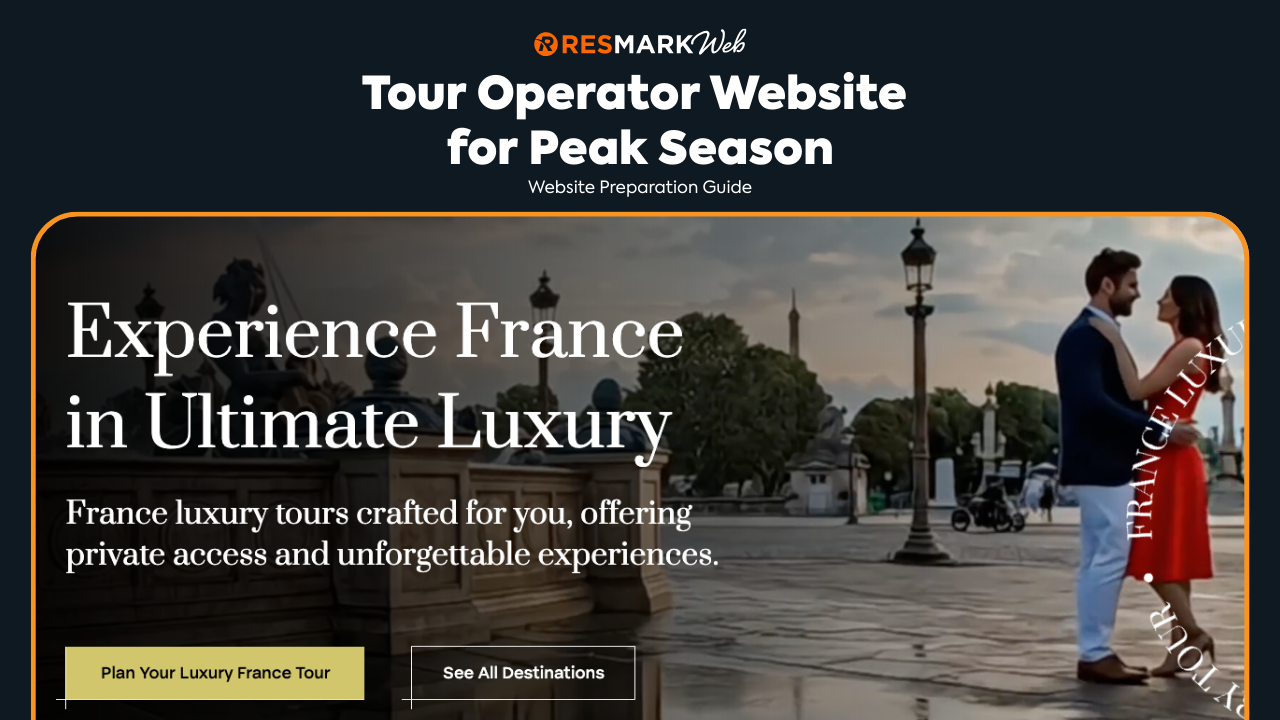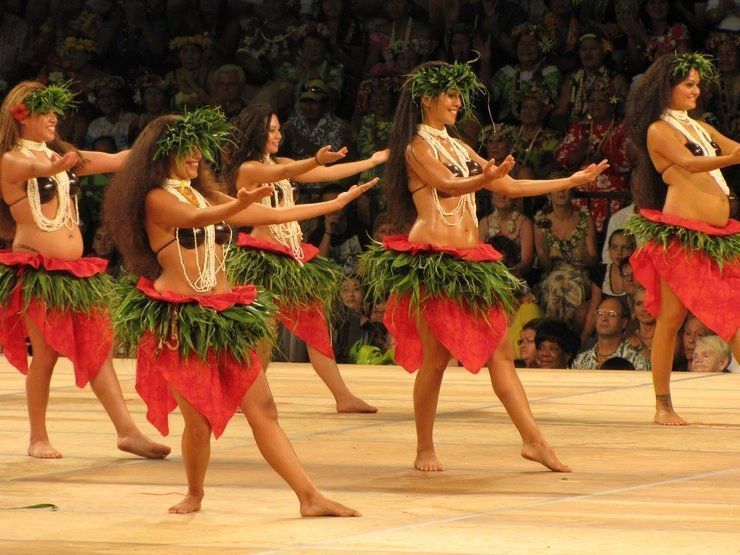How Tour Operators Can Win at SEO and AI Search in 2025
There is so much to unpack here, and it feels like every day there’s new information or a new SEO expert saying something groundbreaking. For tour operators trying to stay visible online, the shift from traditional search to AI-generated responses changes everything.
If you're not actively optimizing your content for Large Language Models (LLMs) like ChatGPT, Gemini, and Perplexity, you're already behind. In 2025, search isn't just about the organic links on Google, it's about Generative Engine Optimization (GEO) and making sure your business is part of the conversation when someone types a prompt into an AI chat.
In this post, I want to dive into:
- What GEO actually is
- How LLMs find and rank your content
- Why Bing and schema markup matter more than you think
- What tour operators (you) must do differently
- Technical recommendations
- Tools to audit and measure LLM visibility
- How to build an SEO and GEO hybrid strategy
What Is GEO (Generative Engine Optimization)?
GEO is the process of optimizing your business for discovery and recommendation inside LLMs. Unlike traditional SEO, where you optimize to rank in Google's search results, GEO is about being referenced inside an AI-generated answer.
LLMs like ChatGPT don't just "search" the internet. They:
- Parse the query (avg. prompt length = 23 words)
- Interpret semantic intent
- Retrieve and rank relevant data
- Generate a synthesized response
Most importantly, they do this from an index of trusted, known sources. If you’re not in those sources, you’re not in the result.
Key Ranking Inputs for LLMs:
- Bing Search Index
- Structured schema data
- Authoritative lists (e.g. "Top 10 Tours in Costa Rica")
- Customer reviews
- Topical authority
- Brand mentions on trusted websites
- UGC (user-generated content)
- Original statistics and firsthand experience
LLMs are trained on what they "trust." If your site isn’t structured correctly, doesn’t have schema, or isn't mentioned on the right 3rd-party sites, you’re excluded.
Not to be Confused with AEO
Answer Engine Optimization (AEO) is about getting your content featured in Google’s quick-answer formats like Featured Snippets or People Also Ask boxes. While AEO focuses on structured, factual content for traditional engines, GEO aims to get your business cited and referenced in AI-generated responses. Both matter, but GEO is how you stay visible in the age of LLMs.
Understand How LLMs Work
To rank in generative engines, you need to understand how they function.
Retrieval-Augmented Generation (RAG)
ChatGPT and other LLMs use RAG (Retrieval-Augmented Generation) to fetch relevant documents before generating responses. Here's how that works:
- Query Parsing: Breaks down the prompt and interprets intent.
- Retrieval: Searches across a fixed set of high-authority documents, often using embedding-based similarity.
- Ranking: Scores candidate documents using hybrid semantic + lexical signals.
- Generation: Synthesizes a text output using the top-ranked sources.
LLMs rely on a knowledge base composed of:
- Crawled Web Content (especially Bing-indexed pages)
- APIs/Partners (TripAdvisor, Trustpilot, etc.)
- Embedded training data (pre-2023 internet snapshots)
Therefore, ranking well in Bing is a precursor to being included in ChatGPT's real-time search layer.
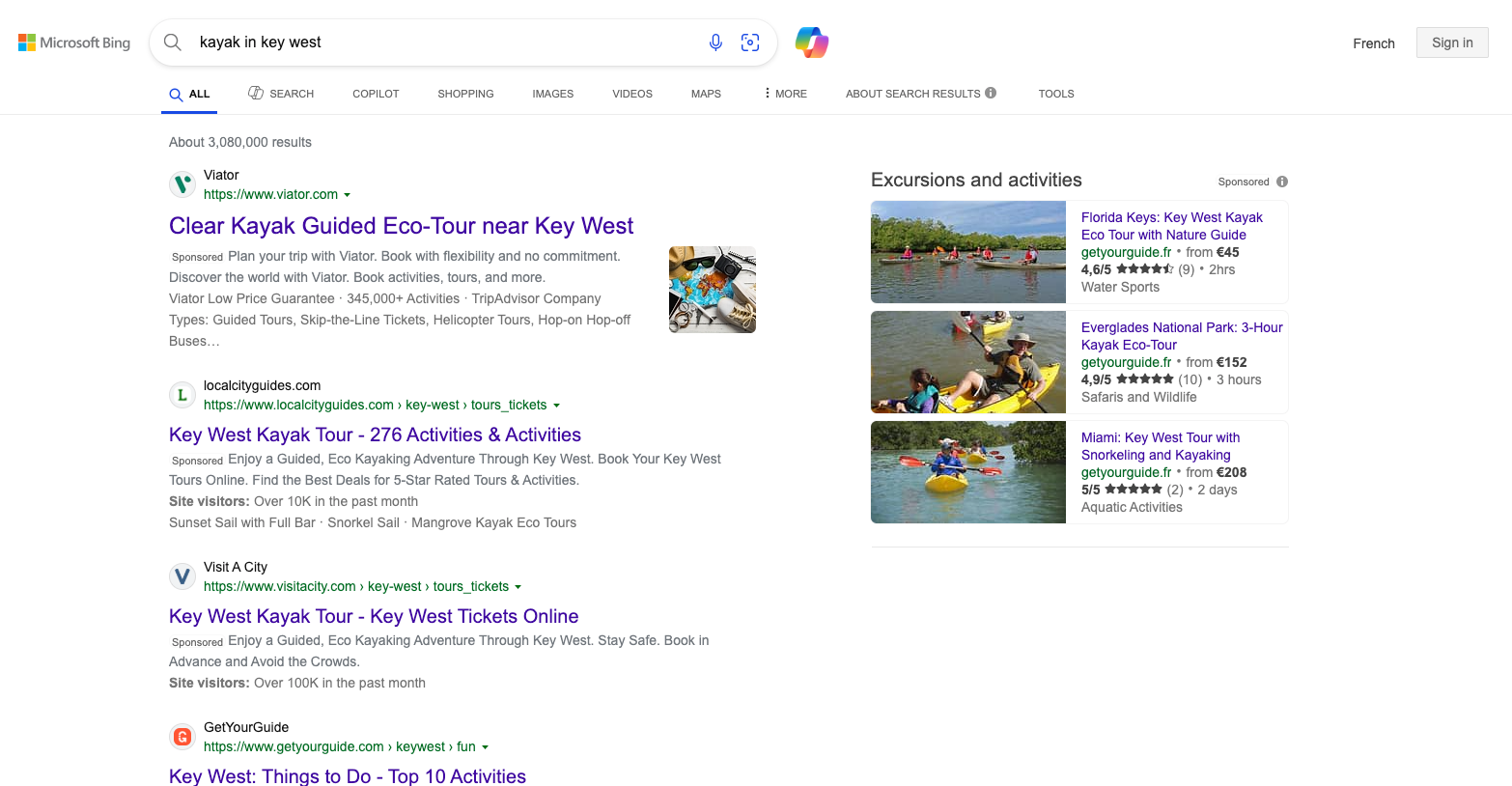
Actionable GEO Recommendations for Tour Operators
1. Get Included in Listicles & Authoritative Roundups
LLMs weight list-style content heavily. Identify:
- Regional roundups ("Best Kayak Tours in Maine")
- Travel blogger curated lists
- Top travel directories
- Tourism board partner pages
How to get in:
- Use tools like BuzzSumo, Ahrefs Content Explorer, or Semrush Link Building Tool to identify targets.
- Email pitches that include social proof, unique tour value, and high-res images.
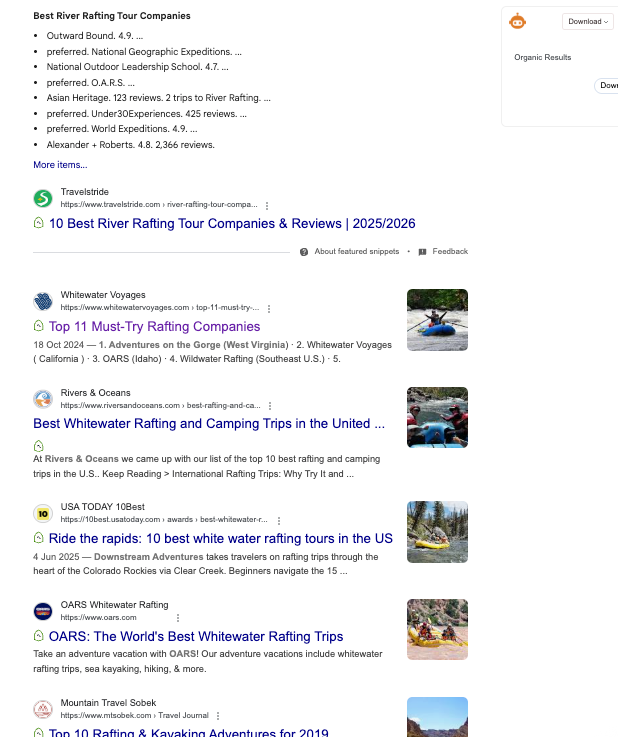
2. Add Structured Schema Markup
Schema helps LLMs and search engines understand your content. Implement:
- LocalBusiness
- TouristAttraction or Product
- Review
- FAQ Page
- BreadcrumbList
- Organization (with sameAs links to social profiles)
You don’t have to write this code from scratch.
- Mermaid Schema Builder – a visual, drag-and-drop schema builder (if available).
Schema.org Generator – lets you choose your type and fills in the code for you.
You then copy and paste the generated code into your website (ideally in the <head> or through your CMS/SEO plugin).
3. Track LLM Traffic and Mentions
Most tour operators have no idea how much traffic they're getting from LLMs. Use our LLM Traffic SOP to set this up.
Tools to Monitor LLM Mentions:
- LLMRefs: Tracks which URLs are referenced by LLMs like ChatGPT and Perplexity.
- Bing Webmaster Tools: Ensure indexing and crawlability.
- Screaming Frog: Audit schema presence and page speed.

4. Increase Topical Authority
LLMs evaluate E-E-A-T (Experience, Expertise, Authoritativeness, Trustworthiness) on a domain level.
Build clusters of content:
- Main page: "Zion Hiking Tours"
- Supporting posts:
- "Best Family-Friendly Trails in Zion"
- "Weather Planning for Zion Spring Tours"
- "What to Pack for a Summer Hiking Trip in Utah"
Use semantic keyword research (via
SurferSEO or
Clearscope) to identify intent-driven variations.
5. Host Unique Data and Personal Experience Content
LLMs need new, original information. Include:
- Booking trends from your CRM
- Guest feedback and quotes
- Custom charts or stats
Generative models can’t fabricate stats, so unique numbers and firsthand insight makes your content more valuable.
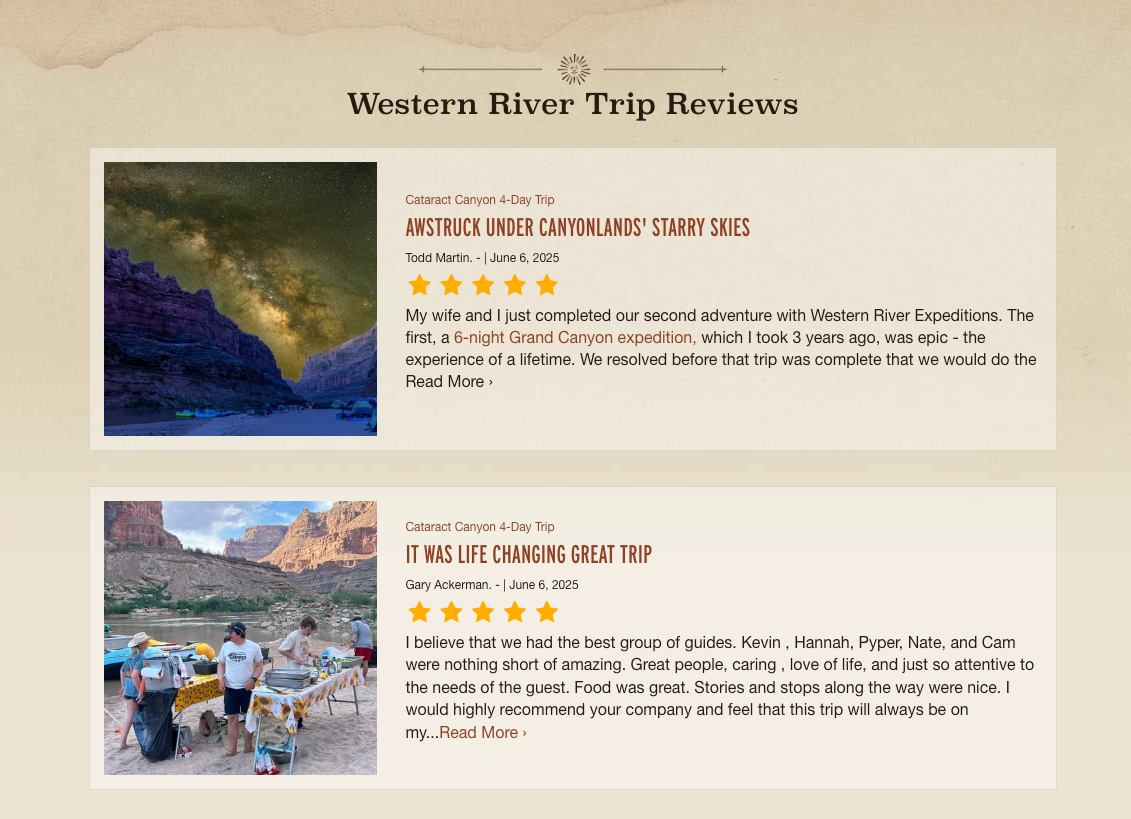
6. Review & Reputation Signals
Add structured reviews to:
- Google Business Profile
- TripAdvisor, Yelp, Trustpilot
- Facebook Recommendations
Use a tool like GatherUp or Grade.us to aggregate and monitor reviews across platforms.
Include schema AggregateRating on your homepage and tour pages.
7. Ensure Crawlable, Accessible HTML
ChatGPT’s bots don’t render JavaScript-heavy content. If key elements are hidden behind scripts, they won't be indexed.
Checklist:
- Avoid JS-only page loads
- Include all critical content in HTML
- Use <h1>, <h2>, <p>, and <ul> correctly
- Keep URL structures flat and clean
Combine Traditional SEO with GEO
SEO isn't dead. In fact, traditional SEO, including tactics like AEO (Answer Engine Optimization) for Google snippets, is a prerequisite for GEO. Structured content and crawlability set the stage for generative models to find and cite your site.
Blog Resource: Basic SEO Tips to Grow Your Tour Business Online
SEO helps you:
- Get indexed by Bing and Google
- Build backlinks
- Increase time-on-page and engagement metrics
- Feed LLMs the right data via authoritative pages
Implement programmatic internal linking between blog content, tours, and location pages.
Want to Get Found in AI Results? Hire an Expert
We work with tour operators every day to:
- Implement GEO & traditional SEO strategies
- Optimize for schema, site speed, and indexing
- Monitor LLM visibility and ranking impact
- Create content clusters that match AI search intent
Learn more:
Tourism Marketing SEO Services
Future-Proof Your Visibility Strategy
Visibility in 2025 is no longer about page 1 on Google. It’s about:
- Being referenced in AI-generated answers
- Having your content indexed by Bing
- Structuring your website for both humans and machines
- Being seen as trustworthy and authoritative
Don’t wait until your bookings slow to figure this out. Audit your current visibility, implement GEO strategies now, and make sure your business isn’t just discoverable - it's recommended.
Frequently Asked Questions (FAQ)
What is GEO and how is it different from SEO?
GEO (Generative Engine Optimization) focuses on optimizing your content to be surfaced and referenced by AI models like ChatGPT and Gemini, while SEO is about ranking on search engine results pages (SERPs).
Do I still need SEO if I focus on GEO?
Yes. Traditional SEO is a prerequisite to GEO. Your content must be discoverable, crawlable, and authoritative to be included in LLM indexes.
Which search engine matters more now: Google or Bing?
Both matter, but Bing has stronger influence over ChatGPT rankings since Microsoft owns a significant stake in OpenAI. Ranking on Bing increases your LLM visibility.
What kind of content does ChatGPT prioritize?
Structured, well-written, high-authority content with original data, strong schema, and presence on trusted websites.
Do AI tools like ChatGPT use my reviews?
Yes. LLMs use reviews from platforms like Trustpilot, TripAdvisor, and Google to assess trustworthiness.
How important is schema markup for GEO?
Critical. Without structured data, LLMs and search engines may not fully understand your content.
Should I create different content for ChatGPT than for Google?
Critical. Without structured data, LLMs and search engines may not fully understand your content.
Is AEO still relevant if I’m focusing on GEO?
Yes. AEO (Answer Engine Optimization) still plays an important role in winning visibility in traditional Google formats like Featured Snippets, FAQs, and voice search. In fact, using schema markup and writing structured, concise content supports both AEO and GEO, so they can work together in your SEO strategy.

